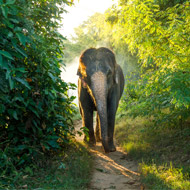
Elephants now free to roam the natural forest
Elephant rides in one of Vietnam’s largest nature reserves have ceased, thanks to the efforts of animal welfare campaigners.
Earlier this month, elephant tours stopped in Yok Don National Park and were replaced with ethical tourism experiences, where visitors observe the park’s four elephants roaming wild in the forest.
The move forms part of an Animals Asia initiative, that it says 'could change the face of elephant tours in the country'. Animals Asia animal welfare manager Dionne Slagter said:
“This project has entirely changed the lives of the elephants at the park and it is also providing a much better experience for the tourists. Exploitation has been replaced with respect and if successful, it’s a model we could see spread across the country and even the region.”
Previously, elephants in the park were chained to trees with heavy riding baskets on their backs, waiting for tourists. The elephants would work up to nine hours a day without access to water, nor were they able to express natural behaviour.
Now the elephants are free to roam the forest, access the river to drink, forage for food and wash themselves in mud baths.
“In the wild, elephants spend up to 18 hours a day foraging and this is exactly how Yok Don’s elephants now spend the majority of their time, Dionne added. “It is rainy season here and there is food everywhere. They all look so much healthier and are increasingly confident in how far they roam.”
The project has been made possible by the UK's Olsen Animal Trust, whose funding will ensure the present legal owners of the elephants will not lose their livelihoods. It is hoped the new model will provide as much, or even more, profit for the owners than elephant rides, and set an example for other facilities to follow.



 The Veterinary Medicines Directorate (VMD) is inviting applications from veterinary students to attend a one-week extramural studies (EMS) placement in July 2026.
The Veterinary Medicines Directorate (VMD) is inviting applications from veterinary students to attend a one-week extramural studies (EMS) placement in July 2026.